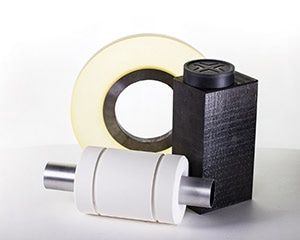Dec 5 2016
Audrey Leon speaks with California-based Materia about a resin the firm hopes will make waves for subsea thermal insulation and other deepwater buoyancy applications.
 Proxima thermoset norbornene resins create composites, foams, and coating for use in challenging offshore environments. Photo from Materia
Proxima thermoset norbornene resins create composites, foams, and coating for use in challenging offshore environments. Photo from Materia
Outside the oil and gas industry, Materia, headquartered outside Los Angeles in Pasadena, California, has a bit of a resume. The company’s catalysts and advanced polymers are used to streamline manufacturing. They even assisted in creating a drug to treat Hepatitis C.
The company is offering its Proxima resin line of products to the offshore oil and gas industry for high-pressure, high-temperature (HPHT) environments for subsea thermal insulation – through a partnership with Bayou Companies, an Aegion subsidiary – and deepwater buoyancy applications.
The resin, says Andy Nickel, Materia’s director of commercial development, is “a new twist on a rather old polymer,” called norbornene thermosets.
“What we have been doing with our Proxima variety of norbornene thermosets is to take these traditional materials that are thermoset polymers with good high-temperature properties and very low water absorption, and very good toughness, and process them into forms that are broadly useful,” says Nickel, who has been with Materia for eight years.
For deepwater buoyancy applications, Materia aims to compete with the tried and true, such as metal cans and foams. “We have materials that have very low density, very low water absorption and very high strength. So, they make very good syntactic foam, or high compressive strength foam that competes favorably with epoxy,” Nickel says.
According to Materia, Proxima STR resins can be cast into large units >250 L in a single casting step without post-cure, unlike epoxy syntactic foams that must be processed in small multi-layer sections. The resins’ low viscosity also makes it easier to process at microsphere loadings up to 60% by volume, resulting in modules that are up to 25% smaller.
For subsea thermal insulation, where low water absorption and good thermal stability are important, Materia believes its Proxima HTI polymers can offer low inherent thermal conductivity and can act as good thermal insulators. Materia says Proxima is fully compatible with line pipe and field joint insulation materials, is castable in double joints, requiring fewer field joints, and compatible with a range of epoxy coatings.
How does it compare?
Nickel says that standard materials used for subsea insulation, especially in high temperature environments, have some serious issues concerning life-span. Thermoplastics (like polypropylene), he says, generally work well, but they soften when you get much above 300°F. “And, if you have any load on a softened thermoplastic, over time, it can flow like a fluid and creep,” Nickel adds. Another material, polyurethane, can be stable at high temperatures, but “will react with water at those temperatures and they will slowly break down over time, turn into butter and disappear into the sea,” Nickel says. “The traditional materials are anticipated to degrade in a few months or years at more than 300°F whereas Proxima is expected to last decades.”
Nickel believes that the Proxima resin is the best of both worlds, between the thermoplastic polyolefin and the thermosetting polyurethane. “[Proxima resins] are cross-linked so they don’t melt and don’t creep,” he says. “They are basically made out of solid oil, if you will, and oil and water just don’t mix.”
Materia, via its partnership with Bayou Companies, has lined up work in the Gulf of Mexico, and recently announced a contract to deliver pipeline insulation for a deepwater development.
While the company is based out of California, it saw a need to be closer to its oil and gas customers. The company has a facility north of Houston in Huntsville, Texas, to manufacture resins. Application testing, product development and catalyst manufacturing are run out of Pasadena, California.
Nitin Apte, president and CEO, says the firm is in the process of expanding its Huntsville location. Currently, Materia has about 40-50 people at the facility. Materia is expanding capacity to manufacture tens of millions of pounds of resin, Apte says, who came to the company this year after a two decade-long career at GE Plastics (later owned by Sabic).
Of the Texas facility, Apte says, “the advantage we have is that we have close to 60 acres of land, a great work force and have space to grow.”